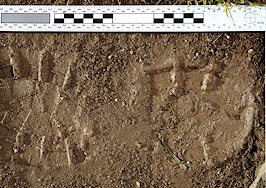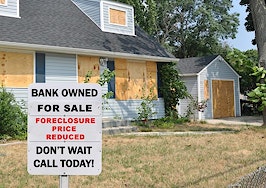- A Denver, Colorado, couple placed an offer on a foreclosed property for their daughter who could not afford to buy a home.
- The mother, Ellyn Rucker, wanted to view the home and made an unscheduled visit. During the visit, she fell on an uneven sidewalk and injured herself.
- Rucker sued the bank that owned the home and the bank's listing real estate broker, arguing the sign in the front yard made her an invitee, thus making the bank and brokerage liable for her injuries.
- The court denied Rucker's claim and said for sale signs standing alone do not invite strangers to enter the private property of others.
Does a for sale sign in front of a house constitute an invitation to walk around the property — and also imply homeowner liability if someone gets hurt doing just that?
That’s what one Colorado woman argued when she slipped and fell on “an uneven part of the sidewalk” while visiting a house that her husband had put an offer on that same morning.
A visit gone wrong
In June 2011, Kristin Rucker began searching for a new home in Denver, but she couldn’t afford the prices sellers were demanding. In an attempt to help their daughter, David and Ellyn Rucker decided to buy a home that Kristin would then rent from them.
David found an unoccupied foreclosed property owned by Federal National Mortgage Association, and he requested a tour of the home from an agent representing Heter and Company, Inc., FNMA’s listing real estate broker. David and Kristin liked the home, and David made an offer on the morning of June 5.
On the afternoon of June 5, Kristin returned to the home with her mother, Ellyn, who wanted to see the home.
At the time of the visit, the doors were locked, so Ellyn went to get a peek of the interior of the home through the front windows. On her way back to the car, she lost her balance on an uneven part of the sidewalk, fell and suffered injuries.
Who’s responsible?
Ellyn filed a lawsuit against FNMA and Heter for the injuries, claiming they were responsible because she was an invitee to the property under the provisions of the Premises Liability Act. The PLA determines a private landowners’ liability to persons entering their land based on whether the person is an invitee, a licensee or a trespasser.
According to the Act:
- “Invitees” are people who enter or remain on another person’s land to transact business that the landowner might find mutually interesting, or who enter or remain on another person’s land in response to “an express or implied representation” that the general public is “requested, expected or intended” to do so.
- “Licensees” are people who enter or remain on another person’s land for the licensee’s own convenience, assuming the landowner has given permission or consent. This includes social guests.
- “Trespassers” are people who enter or remain on the land of another without the landowner’s consent.
According to Ellyn Rucker and her lawyers, the for sale sign in the front yard “constituted an express or implied representation that the public is requested, expected, or intended to remain on the premises.”
Invited or trespassing?
Furthermore, Ellyn said she was an invitee because she was “a person who enter[ed] or remain[ed] on the land of another to transact business in which the parties are mutually interested.”
Four years later, in March 2015, the trial court submitted their final verdict. FNMA and Heter were not liable for Ellyn’s injuries because for sale signs, standing alone, do not invite strangers to enter the private property of others.
Moreover, the court ruled that Ellyn was a trespasser.
Ellyn Rucker appealed this decision to the Colorado Court of Appeals. In July, the appeals court sent down a ruling agreeing with the trial court — Ellyn Rucker had been trespassing.
The court noted:
“We conclude that ‘For Sale’ signs, standing alone, do not create an implied representation to strangers to enter the private property of others. Ellyn does not argue that she had an express invitation, unrelated to the signage, to enter the house,” wrote Judge Fox in response to Ellyn’s appeal.
“As noted in the trial court order, nothing in the record indicates that FNMA had a custom of permitting people to enter the property unaccompanied by a realtor. In fact, Heter stated in depositions that prospective buyers were only allowed to enter properties by appointment and accompanied by a Heter realtor.”
And in conclusion, the appeals court stood by the lower court’s ruling by noting that if a for sale sign is an implied invitation, as Ellyn and her lawyers argued, “then the public-at-large would be free to enter the property at anytime of the day or night.”












